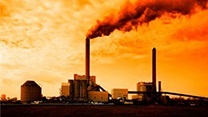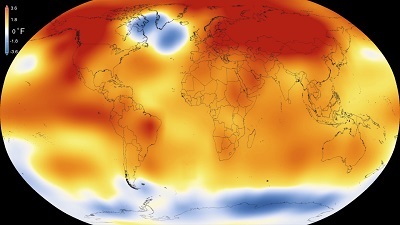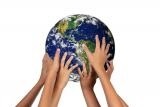|
|
| |
|
|
| |
|
|
| Global warming basic information about a real
problem |
|
| |
 Climate change is happening Climate change is happening
Our Earth is warming. Earth's average temperature has risen
by 1.5°F over the past century, and is projected to rise
another 0.5 to 8.6°F over the next hundred years. Small
changes in the average temperature of the planet can
translate to large and potentially dangerous shifts in
climate and weather.
The evidence is clear. Rising global temperatures have been
accompanied by changes in weather and climate. Many places
have seen changes in rainfall, resulting in more floods,
droughts, or intense rain, as well as more frequent and
severe heat waves.
The planet's oceans and glaciers have also experienced some
big changes – oceans are warming and becoming more acidic,
ice caps are melting, and sea levels are rising. As these
and other changes become more pronounced in the coming
decades, they will likely present challenges to our society
and our environment.
What
are climate change and global warming?
Climate change refers to any significant change in the
measures of climate lasting for an extended period of time.
In other words, climate change includes major changes in
temperature, precipitation, or wind patterns, among other
effects, that occur over several decades or longer.
Global warming refers to the recent and ongoing rise in
global average temperature near Earth's surface. It is
caused mostly by increasing concentrations of greenhouse
gases in the atmosphere. Global warming is causing climate
patterns to change. However, global warming itself
represents only one aspect of climate change. |
|
 Humans
are largely responsible for recent climate change Humans
are largely responsible for recent climate change
Over the past century, human activities have released large
amounts of carbon dioxide and other greenhouse gases into
the atmosphere. The majority of greenhouse gases come from
burning fossil fuels to produce energy, although
deforestation, industrial processes, and some agricultural
practices also emit gases into the atmosphere.
Greenhouse gases act like a blanket around Earth, trapping
energy in the atmosphere and causing it to warm. This
phenomenon is called the greenhouse effect and is natural
and necessary to support life on Earth. However, the buildup
of greenhouse gases can change Earth's climate and result in
dangerous effects to human health and welfare and to
ecosystems.
The choices we make today will affect the amount of
greenhouse gases we put in the atmosphere in the near future
and for years to come. |
|
 Climate
change affects everyone Climate
change affects everyone
Our lives are connected to the climate. Human societies have
adapted to the relatively stable climate we have enjoyed
since the last ice age which ended several thousand years
ago. A warming climate will bring changes that can affect
our water supplies, agriculture, power and transportation
systems, the natural environment, and even our own health
and safety.
Some changes to the climate are unavoidable. Carbon dioxide
can stay in the atmosphere for nearly a century, so Earth
will continue to warm in the coming decades. The warmer it
gets, the greater the risk for more severe changes to the
climate and Earth's system. Although it's difficult to
predict the exact impacts of climate change, what's clear is
that the climate we are accustomed to is no longer a
reliable guide for what to expect in the future.
We can reduce the risks we will face from climate change. By
making choices that reduce greenhouse gas pollution, and
preparing for the changes that are already underway, we can
reduce risks from climate change. Our decisions today will
shape the world our children and grandchildren will live in. |
|
 We
can make a difference We
can make a difference
You can take action. You can take steps at home, on the
road, and in your office to reduce greenhouse gas emissions
and the risks associated with climate change. Many of these
steps can save you money; some, such as walking or biking to
work, can even improve your health! You can also get
involved on a local or state level to support energy
efficiency, clean energy programs, or other climate
programs. Calculate your carbon footprint and find ways to
reduce your emissions through simple everyday actions. |
|
|
|
|
|
|
|
|
|
|
|
|
Additional Climate Change Information |
Climate Change and Carbon Dioxide
(Beginner - Listening,
reading)
A video lesson to
help with your understanding of climate change
and carbon dioxide.
The English is
spoken at 75% of normal speed.
Great English listening and reading practice. |
Carbon Dioxide and Climate Change
(Beginner - Listening,
reading)
A video lesson to
help with your understanding of carbon dioxide
and climate change.
The English is
spoken at 75% of normal speed.
Great English listening and reading practice. |
Environmental Group Warns Earth's Health at Risk
(Beginner - Listening,
reading)
A video lesson to
help with your understanding of climate change.
The English is
spoken at 75% of normal speed.
Great English listening and reading practice.
A report by the World Wildlife Fund looked at thousands of animal populations
and found they have dropped significantly in 40 years. |
Sea Levels Rising at Fastest Rate in 3,000 years
(Beginner - Listening,
reading)
A video lesson to
help with your understanding of climate change.
The English is
spoken at 75% of normal speed.
Great English listening and reading practice.
A group of scientists say sea levels are rising at record rates. Another group
found that January temperatures in the Arctic reached a record high. |
Capturing CO2 Gas Is Not Easy
(Beginner - Listening,
reading)
A video lesson to
help with your understanding of climate change.
The English is
spoken at 75% of normal speed.
Great English listening and reading practice.
Most scientists agree that carbon-dioxide gas is partly to blame for climate
change: rising global temperatures. But capturing the CO2 gas released by power
stations is costly and difficult. |
Growth, Climate Change Threaten African Plants and
Animals
(Beginner - Listening,
reading)
A video lesson to
help with your understanding of climate change.
The English is
spoken at 75% of normal speed.
Great English listening and reading practice.
Researchers believe Africa may lose as much as 30 percent of its animal and
plant species by the end of this century. |
|
|
|
|
Search Fun Easy English |
|
|
|
|
|
|
|
|
|
|
|
|
|
|
|
About
Contact
Copyright
Resources
Site Map |